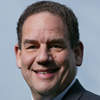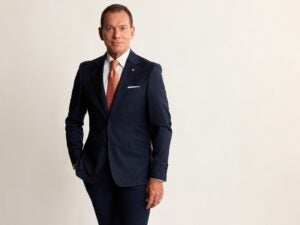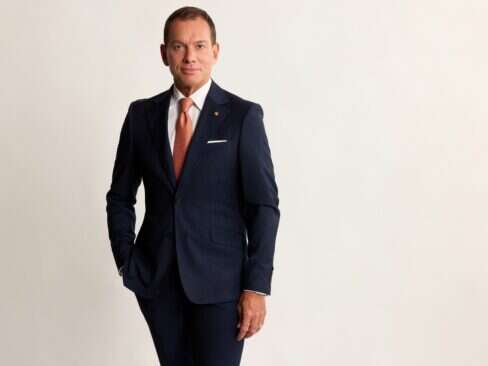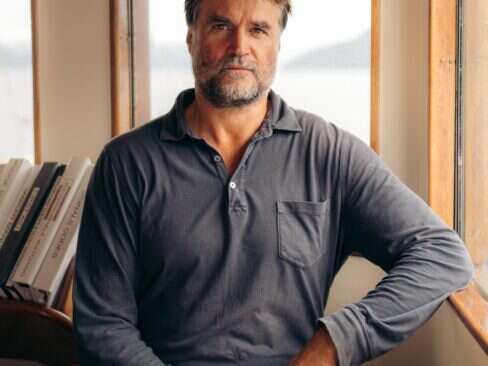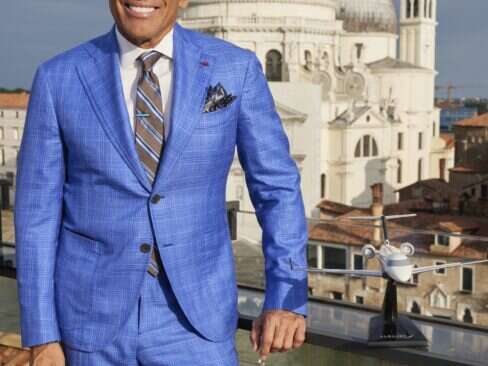Chairman VisitBritain
As chairman of VisitBritain, Christopher Rodrigues has been the biggest proponent of international travel to the U.K. for the last two years. It’s a post that follows a sterling career in travel that has included such roles as president and CEO of Visa International, Group CEO of Bradford and Bingley, COO and CEO of Thomas Cook, and management roles at McKinsey and Co. and American Express. The Harvard Business School graduate is also an executive committee member of the World Travel and Tourism Council, and in 2007 he became a Commander of the British Empire for services to British business interests and charitable works in the U.K. and USA. This spring he met with Elite Traveler’s Editorial Director Laura Hughes at the magazine’s headquarters in New York to talk about Britain’s elite appeal, how the travel business can survive this recession, and why tourism is of crucial importance to individuals and nations around the world.
ET: What people and events through the course of your career have been most influential for you?
Christopher Rodrigues: I have worked with some very good mentors. I suppose, if I go way back, the first highlight had nothing to do with work. But I spent time in team sports, particularly rowing for Cambridge in the Oxford and Cambridge boat races. Rowing is such a great sport to teach about teamwork—you can’t get there before anyone else! And that gets beat into you after 12 years in the sport. And it is a very important lesson today. Travel as an industry, especially an international tourism agency, is very much about working in partnership.
ET: How so?
Christopher Rodrigues: There was a time when agencies told the industry members what they were doing, and invited them to participate if they liked. The industry has moved on at all levels, from the premium level to the everyday level, as the travelers themselves move from wanting destinations to wanting experiences. So we have moved from putting a product on a loading dock to be purchased, to understanding customer needs. Today a great travel agent asks the customer what great experiences they have had. The understanding from that information can be used, together with an agent’s own experience, to make a tailored trip for them.
The travel agent hasn’t changed in 30 years, but the technology has. Before, you and I couldn’t write our own PanAm ticket. (I became a lifetime member of PanAm’s Clipper Club, one year before PanAm went out of business! I guess “lifetime” didn’t apply to me but to the company!) The only difference for the agent is the level at which they are tailoring travel, and it’s as much determined by the resources of the traveler. The first time an American travels to Europe, it is a puzzle. They often don’t speak the language, know the customs, or are familiar with the airport. But they only do that once in a destination. It doesn’t matter how well-off a traveler is, and that puzzle is part of the joy of travel. A great agent needs to know the country they are selling.
ET: What will sell an elite traveler on a trip to Britain today?
Christopher Rodrigues: When it comes to Britain, it’s a country about which all the things you may be passionate about, you can say you haven’t really done them until you’ve been to the U.K. If it is tennis, you have to attend Wimbledon, for theater, the West End. Of course there is football, and the whole cultural world to see in Britain, which covers the full gamut of historical monuments. I did my graduate degree here in the U.S. My roommate had gone to Princeton for his undergraduate and he told me the buildings there dated to 1898. And I told him that at Cambridge, where I was an undergraduate, my building was from 1385! But Britain is also modern, and that is especially seen in music. Americans love music made in the U.S. and in Britain. From the Beatles and the Rolling Stones to today.
The thing that is interesting and relevant for the experienced traveler is that Britain repays on multiple visits because there is always so much you can do. And if you are lucky, you can do it in a comfortable way and enjoy extraordinary experiences. For instance, you can get the best seats at the Royal Opera House, premium seating at the Edinburgh Festival, go hunting on the Welsh border. And the great news is Britain is now a place you would go TO to eat. I was recently in our embassy in Paris with a group of French travel journalists. One said to me that the food in London is now better than in Paris. I said “Yes!” We don’t murder roast beef anymore, and we have a significant number of Michelin-starred restaurants. Britain is also a great place to eat the cuisine of other nations. The River Café happens to be one of the best Italian restaurants in the world. It is run by Ruth Rogers, the wife of Richard Rogers. Also, in the Lake District, there is L’Enclume, in Cartmel-Over-Sands, with a Michelin star. People get excited over the Fat Duck in Bray, but L’Enclume is fairly priced and in the beautiful countryside.
There are just so many things you can do in a relatively small space in Britain. People think it takes some time to get to York from London, but it equals the distance from New York to Washington DC, and the experience is slightly better.
ET: Who have your mentors been?
Christopher Rodrigues: In travel, there was Tomasso Zanzotto. He was with American Express when I first got into travel, and he was a great manager of people. He taught me about great attention to detail and to set a strategic direction. I remember when I was with McKinsey, I visited the American Express office in La Havre. That office should have been a disaster because it was the late 1970s when the U.S. was not really popular in France, and it was in Le Havre, where transatlantic ships used to sail from but they no longer did by then—people were flying now. So no boats, and no Americans. But it was run by the best local travel office manager I’ve ever met. He knew destinations, and he knew his community. Everyone did business with him because his people were great at serving their community. American Express had a Great Performers award, and the winners never understood why they won. The reward recognized great service, and these people always just thought that was how you did your job.
I was also greatly influenced by Lou Gerstner at American Express. He ran RJReynolds and IBM after American Express. He was a legend for being deeply analytical. And he understood travel, in that it defined the internationality of American Express. If you were a card member, and went to Cusco in Peru, you would find an American Express office and if you were a customer they would look after you. For them, I won the bid for running the corporate travel business after I was asked, “If I was in Cusco and something went wrong, what would you do?” So I said, “Walk half way down the street, look right, and you’ll find our American Express office.” I got it!
Then there was James D. Robinson III, CEO at American Express. He was the first to pull the industry together to make the case for tourism to governments around the world. It had been fragmented, but the travel industry employs 8 percent of the world. And it is great for careers, helps the regeneration of areas, and is good for the cultural heritage of a country because destinations tend to invest in the cultural sides of a country, which benefits residents as well as visitors.
Going on to Thomas Cooke, where I was COO and then CEO, I was with the company that started travel as we see it today. The first trip was in 1841, and Thomas Cooke took people by train—for one shilling—and in doing so created the first added-value tour because he gave tea and cakes to passengers and had a brass band playing. By 1851, when the Great Exhibition was taking place in Victorian England, he shifted 180,000 people on a rail network that had no through tickets. So he invented them! Then, there was no internet, no phone, no telex. Other than that it was just like today! The company has marvelous archives, created by Edmund Swinglehurst. He started as a Thomas Cooke rep in the Italian Lake district. He rather liked kippers, so he had them sent weekly to him on the Orient-Express. He got travel in a way that every traveler who reads Elite Traveler gets: it’s a life of enriching experiences. When we put the archives on show, we found we had the son of Kaiser Wilhelm, the crown prince, travel in the Holy Land in the 1870s and he had Thomas Cooke organize it. So the Prussian king got the English travel agent. Cooke’s son organized it, and then the Almanach de Gotha, much like the “400” of European royalty, decided they would only book through Cooke too. That carried through and in the 1980s Thomas Cooke still had a department called “Princes and Kings.” And you think you are elite!
ET: How does tourism survive in a difficult economy like this?
Christopher Rodrigues: This [recession] is the toughest time I’ve seen, and we are discussing how to manage through it and into recovery. The travel industry is optimistic. Travel has moved from being a privilege to being a right. It defines political freedom. I remember 20 years ago, in Venice, the minister of tourism there said he had 50,000 tourists from Poland. The key point was, for these people the ability to go to Venice defined their newfound freedom. It is truly the best part of this industry—people learning and respecting other cultures, and understanding other people.
I am optimistic that we will come through this because travel is so central to peoples’ lives. I’m not euphoric this year, it is tough. And travel is a high-cost, low-variable business. When you lose a little bit of your margin you lose a lot of profit. This industry runs best when it is at nearly full capacity. If not, it’s not really profitable. But travel fills a deep human need to explore. That will always be there. In the short term, whichever people have enough money to do what they want to do will travel. The industry has been much better lately for creating recognition that tourism grows GDP in developing countries. It is a high-employment business, and now people are also much smarter about maintaining a destination’s qualities and standards. In the 1970s there was strip development and concrete block hotels, especially in the U.S. and Mediterranean, but that’s not happening now. It is a challenge to run a business in a resource-restrained world. And that goes beyond any carbon footprint. For example, in Britain, the National Trust has to rebuild lake paths in the winter because use is so high in the summer. The ideal would be to get tourism as close as possible to net neutral. I’m not talking about ecotourism, but ordinary travel. Otherwise, travel will be demonized, and then it gets taxed, and then limited, and then freedom to travel becomes constrained.
ET: What signs of hope do you see for travel growing in a planet-friendly way?
Christopher Rodrigues: Bill Marriott is investing in a large track of rainforest as an off-set of his properties, and that’s very interesting. Airlines and engine manufacturers are actually doing great for fuel efficiency. I met the minister of tourism of Botswana last year, and after he spoke he nearly got a standing ovation—his comments were just so practical. I also take hope from China’s stance, that they want people to travel. And of specific travel experiences, I look at a visit to Siem Riep, and seeing the courage of the children who lost limbs in mine fields, and they are full of joy and hope and employed in tourism. For them to go through the Pol Pot regime and come out enthusiastically about their country is positive.
ET: What other recent trips have you found most enjoyable?
Christopher Rodrigues: I just spent a week skiing in Jackson Hole, and that is a fantastic mountain. I used to do a business trip and add on leisure. Now I take a vacation and add a low-cost business add-on! Also, in Costa Rica I did the canopy zip line. That is a long way up in the air, and it is a great experience. Another is thanks to my job as head of the tourism agency for Britain. A lot of my career has taken me outside Britain. So a joy has been coming back to see much more of Britain in a new way. Last year Liverpool was the capital of culture for Europe, and it was transformational. The restaurant quality improved, it brought in culture and a new conference center. That was a regeneration project. Now the government is discussing different capitals of culture just for the U.K., as it brings so much civic pride.





